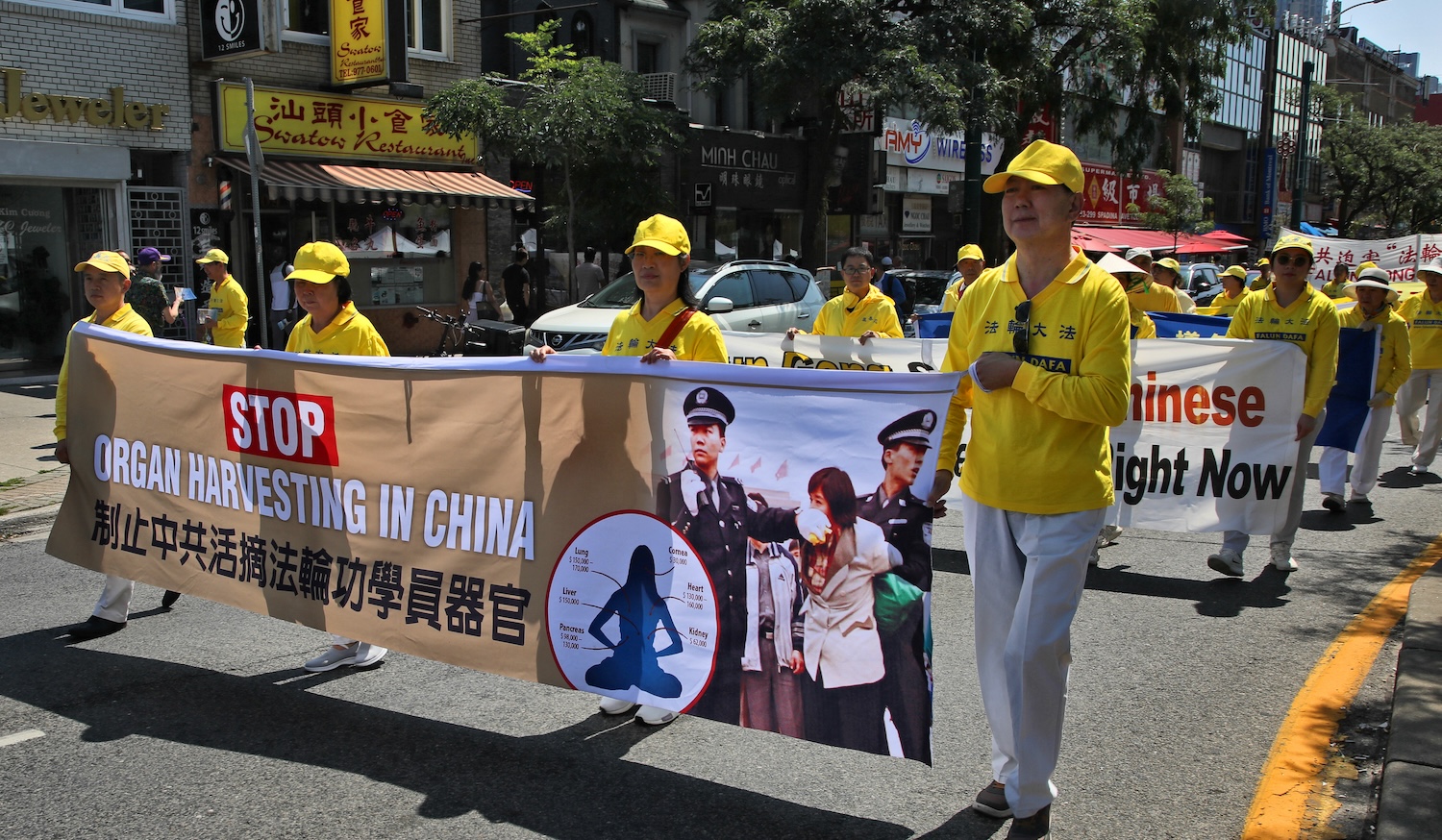On Monday, the U.S. Department of Justice announced that it had arrested Weidong Guan, the CFO of an international newspaper and media company called The Epoch Times, and charged him with money laundering and bank fraud. According to the government's indictment, the vast majority of The Epoch Times' revenue came not from advertisers or subscribers, but rather from fairly straightforward identity theft. The mechanics of the scheme are fairly simple: Per the DOJ, Epoch Times operators would steal people's personal information, use said information to file fake unemployment claims, then launder that money through prepaid debit cards and cryptocurrency (finally, a use case!) back to the parent organization. Though the players involved are colorful and interesting, one can only fully appreciate this scam after understanding the long arc of the Times' parent organization.
The Epoch Times is a subsidiary of the Falun Gong, a 30-ish-year-old cult founded by quack spiritual practitioner Li Hongzhi in China. Their deal is generally fascinating (I'd recommend the three-part TrueAnon series from the summer of 2023 if you want the super-long version), but the main things to know are: Their foundational spiritual doctrine is an esoteric offshoot of Qigong practice, a syncretic fusion of some aspects of Buddhism with bog-standard cult of personality shit, energy meditation, and the belief that Li can do ESP; their raison d'etre is less spiritual and more political, as they are oriented entirely around antagonizing the Chinese government. Li left China in the mid-1990s, and the group was officially sanctioned by the Chinese government in 1999 (for all of their wackier claims, the CCP really did try to disband the Falun Gong). The following year, Li took the natural next step for anyone who wants to cement their status as a charismatic leader and bought a 400-acre chunk of land in upstate New York.
Seven years later, the Falun Gong-affiliated dance troupe Shen Yun kicked off their first tour, attempting to capture "5,000 years of civilization reborn" and tell the story of China before communism. They still tour to this day, and while I have not gone myself (not for lack of trying; tickets are kind of expensive), I heartily recommend Jia Tolentino's 2019 review of the performance, which sounds frankly hallucinogenic.
In 2009, the Falun Gong published a book, Nine Commentaries on the Communist Party, in which they detailed the Chinese government's malicious persecution of "100 million Falun Gong members" and excoriate them for "nearly 100 million unnatural deaths" (there's that number again). It's honestly pretty bland by the standards of the form, though it's become a bedrock text for members of U.S. Congress to refer to when expounding on the crimes of the Chinese government, namely the deadly and allegedly rampant harvesting of organs from Falun Gong members. That was their main line of public appeal: These guys are yoinking our kidneys etc. Although kidneys were yoinked, there is no evidence of anything so widespread or systematic.
The Chinese government has since admitted that doctors did harvest the organs from executed prisoners to fuel black-market trade. The U.S. House of Representatives passed a resolution condemning the practice in 2016, which singles out the Falun Gong as victims. If you follow the Falun Gong's thread, the main piece of evidence they use is a 2006 report from a trio of Canadians, which uses inductive reasoning to establish, A) the persecution of the Falun Gong, and, B) the size of the organ transplant black market in China between 1994 to 2005, before C) drawing a line between A) and B) and concludes that probably every single illegal organ sold, 60,000 to 100,000 per year since 1999, must necessarily have come from a murdered Falun Gong practitioner. However, a 2017 Washington Post investigation showed that was impossible, as the immunosuppressants needed to carry out organ transplants are highly regulated, and an analysis shows China's use of the drugs "is roughly in line with the proportion of the world’s transplants China says it carries out." A lawyer who'd defended between 300 and 400 Falun Gong members also told the Post he'd never heard of anyone's organs being harvested.
The way the Falun Gong launders the organ harvesting claim is interesting, and brings us, finally, back to The Epoch Times. Take this 2019 NBC News story on the supposed $1 billion Chinese black market for organs, a story that reports soberly on the findings of the "international," "independent," vaguely real-sounding China Tribunal. The China Tribunal is downstream of the International Coalition to End Transplant Abuse in China, which is staffed extensively by Epoch Times contributors.
But The Epoch Times is known less as a propaganda outlet for a cult than it is for being one of the most annoying founts of viral sludge of the past decade. They began publishing in Chinese in 2000 and in English four years later, mostly as a physical paper that nobody read, though they kept chugging along and even won a few awards. In 2015, Facebook tweaked their algorithms and The Epoch Times, then short on money, went Upworthy mode to a degree nobody else could match, publishing an astonishing amount of bullshit. Most of their stories were about a duck befriending a pug or whatever, though the Facebook boom was contemporaneous with the election and their politics posts did monster traffic. There was a natural synergy: Donald Trump was virulently anti-China, and so The Epoch Times glommed onto him. Once Trump won in 2016, they hired Tea Party worm Brendan Steinhauser to help them win influence in the Trump White House, and they became buddies with Steve Bannon and Miles Guo, whose story is super kooky in its own right.
Their editorial output from that point on essentially followed a weirder version of the template for right-wing media through the Trump and early Biden years. COVID-19 was simultaneously a weapon controlled by the CCP to kill its enemies, but also not real enough that vaccines against the disease were anything but another tool by the deep state to control you. Facebook eventually cracked down on The Epoch Times and their network of affiliated sites like New Tang Dynasty, Truth Media, and America Daily, so they moved their advertising and a lot of their output over to YouTube. Within their cohort of right-wing sites of this era, they did not do much to stand out, though they were often quoted and retweeted by Republican lawmakers. The one thing that was interesting about them was all the money they were making. They put up a bunch of 2005-ass billboards around the country earlier this year and they somehow gave $5 million to failed California recall candidate Larry Elder. Their explanation that the money came from ads, subscriptions, and donations from well-to-do Falun Gong members didn't fully add up.
Per the DOJ indictment, The Epoch Times' revenue quadrupled in 2020, from $15 million to $62 million. That's roughly when CFO Weidong Guan, the guy who got arrested this week, began managing the coolest group in all of digital media: the Times' Making Money Online team. They allegedly carried out their duties by doing identity theft and taking advantage of pandemic-era expansions to unemployment payouts. Banks, employees, even crypto platforms kept asking Guan where the money was coming from, but he seems to have ignored them.

In a statement given to The New York Times, The Epoch Times said it "has a guiding principle that elevates integrity in its dealings above everything else," and also that they'll cooperate with the investigation. The fate of the Making Money Online team is not currently clear, though one assumes they will have to find new ways of making money, online.





